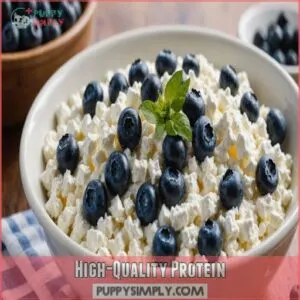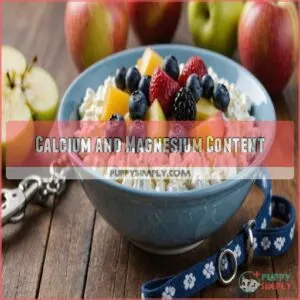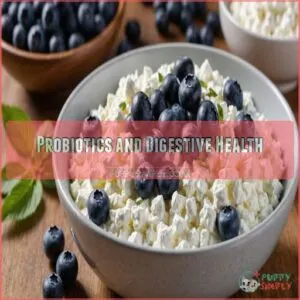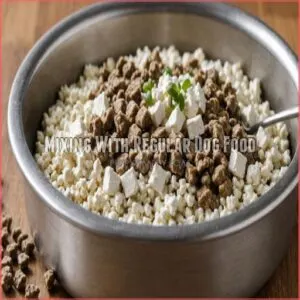This site is supported by our readers. We may earn a commission, at no cost to you, if you purchase through links.
 Yes, dogs can eat cottage cheese, but like any treat, moderation is key.
Yes, dogs can eat cottage cheese, but like any treat, moderation is key.
This dairy delight is packed with protein, calcium, and probiotics, making it a nutritious snack for your furry friend.
However, some pooches may be lactose intolerant, so watch for signs of tummy trouble.
Stick to plain, low-fat varieties and avoid flavored options with added salt or sugar.
Think of cottage cheese as the occasional doggy dessert rather than a daily dish.
Mix a spoonful into their regular food for a tasty twist, or use it to hide pills when needed.
But before you start serving up cottage cheese, there are other factors to think about regarding your dog’s diet and digestive health.
Table Of Contents
- Key Takeaways
- Is Cottage Cheese Healthy for Dogs?
- Benefits of Cottage Cheese for Dogs
- Concerns About Feeding Cottage Cheese to Dogs
- How to Feed Cottage Cheese to Dogs
- Preparation Tips for Cottage Cheese
- Healthy Alternatives to Cottage Cheese
- Creating a Balanced Diet With Cottage Cheese
- Frequently Asked Questions (FAQs)
- Is cottage cheese good for dogs?
- Is cottage cheese good for health?
- How much cottage cheese can a dog eat?
- Can dogs eat organic cottage cheese?
- What happens if a dog eats cottage cheese?
- Can dogs eat lactose-free cottage cheese?
- How much cottage cheese can I give my dog?
- Which is better for dogs, yogurt or cottage cheese?
- What is the safest cheese for dogs?
- Is daisy cottage cheese ok for dogs?
- Can puppies eat cottage cheese?
- Is low-fat cottage cheese better for dogs?
- How often can dogs have cottage cheese?
- Can cottage cheese help with dog diarrhea?
- Are there any breeds that shouldnt eat cottage cheese?
- Conclusion
Key Takeaways
- You can feed your dog cottage cheese in moderation, but limit it to 10% of their daily calorie intake to maintain a balanced diet.
- Choose plain, low-fat cottage cheese and avoid varieties with added flavors or ingredients that could be harmful to your dog.
- Watch for signs of lactose intolerance or digestive issues when introducing cottage cheese to your dog’s diet.
- Consider alternatives like dog-safe fruits and vegetables, commercial dog treats, or plain yogurt if your dog does not tolerate cottage cheese well.
Is Cottage Cheese Healthy for Dogs?
You’ve probably wondered if that tub of cottage cheese in your fridge is safe for your furry friend.
While cottage cheese can offer some nutritional benefits for dogs, it’s essential to consider other healthy snack options, such as plain yogurt for dogs, to provide a balanced and varied diet. While cottage cheese can offer some nutritional benefits for dogs, it’s important to understand the potential risks and feeding guidelines to keep your pup healthy and happy.
Nutritional Value of Cottage Cheese
How nutritious is cottage cheese for your furry friend? It’s a mixed bag. While cottage cheese packs a protein punch and offers calcium benefits, it’s not a complete meal for dogs. Here’s what you need to know:
- High-quality protein source
- Rich in calcium for strong bones
- Contains probiotics for gut health
- Low in lactose compared to other dairy
Remember, moderation is key. Cottage cheese can be a part of a homemade bland diet, often used to encourage dogs with a loss of appetite in sick dogs, but it shouldn’t replace your pup’s regular dog food. Always consult your vet before making dietary changes.
Potential Risks of Feeding Cottage Cheese
While cottage cheese can be a tasty treat, it’s not all smooth sailing for your furry friend.
Overindulging can lead to digestive upset, causing your pup discomfort.
Weight gain is another concern, as cottage cheese packs more calories than you might expect.
In rare cases, it could trigger pancreatitis, especially in dogs prone to the condition.
Some pooches may even have allergies to dairy products.
Always introduce new foods cautiously and watch for any signs of trouble.
Lactose Intolerance in Dogs
Your furry friend might be lactose intolerant, making cottage cheese a no-go.
Many dogs lack the enzyme to break down lactose, leading to tummy troubles.
Symptoms include bloating, gas, and diarrhea.
If you suspect lactose intolerance, try dairy alternatives or consult your vet for testing.
Managing your pup’s diet is key to their digestive health.
Remember, every dog’s different – what works for one mightn’t suit another.
Benefits of Cottage Cheese for Dogs
You might be surprised to learn that cottage cheese can offer some benefits for your furry friend.
This beneficial snack is often found in dog foods designed for sensitive stomachs, as seen in top-rated sensitive stomach dog food. This calcium-rich treat packs a protein punch and contains probiotics that may support your dog’s digestive health, making it a potentially valuable addition to your dog’s diet when given in moderation.
High-Quality Protein
Cottage cheese packs a protein punch for your pup.
As a lean protein source, it supports muscle building and maintenance, especially beneficial for active dogs.
Here’s why cottage cheese can be a tail-wagging addition to your dog’s diet:
- Easily digestible for most dogs, making it gentle on tummies
- Contains all essential amino acids for the best canine nutrition
- Promotes satiety, helping your furry friend feel full and satisfied
Just remember, moderation is key to avoid any potential digestive hiccups.
Calcium and Magnesium Content
The calcium and magnesium in cottage cheese can be a real bone-ifier for your pup!
These minerals play important roles in your dog’s health.
Let’s break it down: You can even find products specifically designed to boost your dog’s calcium intake with cottage cheese calcium supplements, which can be a great addition to their diet.
| Mineral | Benefits for Dogs |
|---|---|
| Calcium | Bone strength |
| Teeth health | |
| Muscle function | |
| Blood clotting | |
| Nerve signaling | |
| Magnesium | Enzyme function |
| Energy production | |
| Muscle health | |
| Nervous system | |
| Bone formation |
Remember, moderation is key. A balanced diet is your best bet for keeping your furry friend’s mineral balance in check.
Probiotics and Digestive Health
Did you know cottage cheese can be a powerhouse for your dog’s gut health?
It’s packed with probiotics, those friendly gut bacteria that support healthy digestion, which can be especially beneficial if your dog has experienced issues like persistent diarrhea symptoms.
These tiny helpers can ease digestive issues and boost your pup’s overall well-being.
Just remember, moderation is key. Too much might upset your dog’s stomach.
Concerns About Feeding Cottage Cheese to Dogs
While cottage cheese can be a tasty treat for your pup, it’s not without risks.
You’ll want to be aware of potential issues like digestive upset, weight gain, and allergic reactions before adding it to your dog’s diet.
Overeating and Digestive Issues
While cottage cheese offers benefits, too much can spell trouble for your furry friend.
Overeating this dairy delight might lead to a comedy of errors in your dog’s tummy.
Here’s what you need to watch out for:
- Upset stomach: Your pup might feel like they’ve got a storm brewing inside
- Diarrhea: The backyard could become a messy obstacle course
- Vomiting: Prepare for potential carpet cleaning duties
- Gas: Sudden room-clearing abilities may develop
- Bloating: Your dog might temporarily resemble a fuzzy balloon
Obesity and Pancreatitis
Overfeeding cottage cheese can tip the scales for your furry friend.
It’s high in calories, potentially leading to dog obesity if you’re not careful.
What’s more, the fat content can spell trouble for your pup’s pancreas health.
Pancreatitis is no walk in the park, often causing severe stomach discomfort.
To keep your dog’s tail wagging, practice moderation with cottage cheese and focus on balanced dog food choices for good weight management.
Allergies and Sensitivities
Beyond weight concerns, some dogs may have allergies or sensitivities to dairy.
If your furry friend’s tummy does the rumba after a cottage cheese snack, they might be lactose intolerant.
For more specific information on how to manage dog dairy allergies, you can explore products designed for dog dairy allergy relief.
Keep an eye out for signs like itching, vomiting
How to Feed Cottage Cheese to Dogs
If you’ve decided to treat your furry friend to some cottage cheese, it’s important to do it right.
Let’s explore the proper ways to serve this dairy delight to your dog, ensuring both enjoyment and safety.
Safe Amounts and Frequency
Now that you’re aware of potential concerns, let’s talk about serving sizes.
Your dog’s size is important when it comes to cottage cheese portions.
A good rule of thumb is to offer 1-2 tablespoons per 20 pounds of body weight, no more than twice a week.
Here’s a quick guide:
- Small dogs (under 20 lbs): 1 tablespoon
- Medium dogs (20-50 lbs): 2 tablespoons
- Large dogs (over 50 lbs): 3 tablespoons
Remember, moderation is key to keeping your furry friend healthy and happy!
Mixing With Regular Dog Food
Dogs with sensitive stomachs can benefit from a balanced diet, and a great resource for that is learning about the best sensitive stomach dog food. Spice up your pup’s meals by mixing cottage cheese with their regular dog food.
This protein boost adds a tasty twist to their diet.
Start with a tablespoon per cup of kibble, adjusting the ratio based on your dog’s size and needs, and make sure to choose a suitable cottage cheese brand like those found at Cottage Cheese Brands.
Keep an eye on
Adding Fruits and Vegetables
Elevate your pup’s cottage cheese treat by adding dog-safe fruits and veggies.
Mix in diced apples, blueberries, or mashed pumpkin for a nutrient boost.
Remember, moderation is key!
Stick to small serving sizes and introduce new combos gradually to avoid tummy troubles.
Try a "Cottage Cheese Veggie Delight" by blending low-fat cottage cheese with grated carrots and a sprinkle of parsley.
Your furry friend will be begging for more of these healthy snacks!
Preparation Tips for Cottage Cheese
You’ll want to keep things simple when preparing cottage cheese for your furry friend.
Stick to plain varieties without added flavors or ingredients.
Consider freezing small portions for a cool, tasty treat on hot days.
Choosing Plain Cottage Cheese
For cottage cheese for dogs, plain is the name of the game.
Skip the flavored varieties and opt for low-fat options to keep your pup’s waistline in check.
Check the ingredient list for simplicity – fewer additives mean a happier tummy.
Remember, not all brands are created equal.
Look for those with lower lactose levels if your furry friend has a sensitive stomach.
Your dog’s health is worth the extra minute at the grocery store.
Avoiding Extras and Additives
Now that you’ve chosen plain cottage cheese, let’s talk extras.
Your furry friend’s health comes first, so steer clear of additives. Stick to natural, dog-friendly options:
- Natural vs. Artificial: Opt for fresh fruits over artificial flavors
- Sugar-free options: Avoid sweeteners, even if they’re marketed as "sugar-free"
- Safe spices: A dash of cinnamon or turmeric can add flavor without harm
Remember, simple is best. Your pup’s tail will wag just as happily for plain cottage cheese as it would for fancy mix-ins.
Freezing and Refrigeration
In the fridge, cottage cheese stays fresh for about a week.
For longer storage, you can freeze it for up to three months, but remember to thaw it in the fridge overnight.
check out these tips for storing homemade dog treats
Thaw frozen cottage cheese in the fridge overnight, but expect texture changes.
For your pup’s digestive health, serve small portions at room temperature.
To minimize the risk of stomach discomfort, consider a gradual food transition process, like a 7-10 day transition plan. Remember, proper storage is key to avoiding dog food safety issues and potential stomach discomfort.
Healthy Alternatives to Cottage Cheese
If your dog isn’t a fan of cottage cheese or you’re looking for variety, there are plenty of healthy alternatives to choose from.
You can offer your furry friend small portions of dog-safe fruits and vegetables, specially formulated commercial dog treats, or even a dollop of plain yogurt or natural peanut butter as occasional treats.
Fruits and Vegetables
From the garden to your pup’s bowl, fruits and veggies offer a rainbow of dog-safe options.
Carrots crunch like nature’s toothbrush, while blueberries pack an antioxidant punch.
Slice up some apple for a sweet treat, or steam broccoli for a fiber boost.
Just remember, moderation’s key.
These colorful snacks support your furry friend’s digestive health and can even help with food intolerances.
Mix and match to create tasty, homemade recipes your dog will love.
Commercially Available Dog Treats
Pet stores offer a smorgasbord of healthy alternatives to cottage cheese.
You’ll find treats packed with nutrient-rich ingredients like sweet potato, salmon, and blueberries.
Look for brands that prioritize ingredient safety and offer variety to keep your pup’s taste buds excited.
Make sure you’re getting the best bang for your buck by comparing labels.
Remember, moderation is key – even with healthy snacks.
Your dog’s main nutrition should come from their regular food, with treats as occasional bonuses.
Yogurt and Peanut Butter
Looking for tasty alternatives to cottage cheese?
Yogurt and peanut butter are fantastic options for your furry friend. They’re delicious and also pack a nutritional punch.
Here’s what you need to know:
- Plain, unsweetened yogurt offers probiotics for digestive health
- Dog-safe peanut butter provides protein and healthy fats
- Yogurt can soothe upset stomachs and boost immunity
- Natural peanut butter (xylitol-free) makes a great treat
- Both can be frozen for a
Creating a Balanced Diet With Cottage Cheese
You can make cottage cheese a healthy part of your dog’s diet by following the 10% rule: limit it to no more than 10% of their daily calorie intake.
Keep an eye on your pup’s digestive health and consult your vet for personalized guidance on incorporating this creamy treat into their meals.
Limiting Cottage Cheese to 10% of Daily Calories
While cottage cheese can be a tasty treat, it’s essential for pet owners to understand the caloric needs of their dogs, especially for those requiring high calorie dog food.
It’s important to keep your pup’s diet in check.
Stick to the 10% rule: limit cottage cheese to no more than a tenth of your dog’s daily calories.
This helps maintain a balanced diet and prevents weight gain.
Remember,
Monitoring Digestive Health
Introducing cottage cheese to your dog’s diet? Keep a watchful eye on their digestive health.
Monitor stool consistency, watching for signs of dog diarrhea or vomiting.
If you notice any stomach discomfort or bloating, it’s time to hit the brakes.
Start with small amounts and gradually increase the frequency of feeding.
Remember, every pup’s different – some might handle dairy like champs, while others may have lactose intolerance or food sensitivities.
Trust your gut instinct!
Consulting a Veterinarian for Guidance
If you want to create a balanced diet with cottage cheese, your vet’s advice is worth its weight in gold.
They’ll help you navigate the tricky waters of dog food allergies and dairy intolerance.
Here’s what your vet can do:
- Assess your dog’s specific needs
- Create a personalized feeding schedule
- Recommend safe treats and alternatives
Don’t let uncertainty gnaw at you – a quick chat with your vet can set your mind at ease about your furry friend’s digestive health.
Frequently Asked Questions (FAQs)
Is cottage cheese good for dogs?
Cottage cheese can be good for dogs in moderation.
It’s packed with protein and calcium, but be cautious.
Some pups are lactose intolerant, so watch for tummy troubles.
Offer small amounts as an occasional treat, not a daily staple.
Is cottage cheese good for health?
You’ll find cottage cheese packs a nutritional punch.
It’s loaded with protein, calcium, and probiotics, supporting bone health and digestion.
However, it’s high in sodium, so enjoy it in moderation.
Balance is key in your diet!
How much cottage cheese can a dog eat?
It’s a doggy dilemma!
You shouldn’t go overboard with cottage cheese.
Stick to 1-2 tablespoons for small dogs and up to 1/4 cup for larger breeds.
Always monitor your pup’s reaction and keep it as an occasional treat.
Can dogs eat organic cottage cheese?
While organic cottage cheese is safe for dogs, it’s not much different from regular cottage cheese.
Feed it sparingly as an occasional treat.
Remember, some dogs are lactose intolerant, so watch for any digestive issues after giving it to your pup.
What happens if a dog eats cottage cheese?
Most dogs handle small amounts of cottage cheese well, enjoying its taste and nutrients.
However, some may experience digestive upset, especially if lactose intolerant.
Moderation is key; excessive consumption can lead to bloating, diarrhea, or weight gain.
Can dogs eat lactose-free cottage cheese?
Lactose-free cottage cheese is a safer option for dogs, especially those with lactose intolerance.
You can offer small amounts as an occasional treat.
Remember, moderation is key.
Always introduce new foods gradually and watch for any adverse reactions.
How much cottage cheese can I give my dog?
Ironically, your dog isn’t begging for a cottage cheese buffet.
You should limit it to 1-2 tablespoons occasionally, based on your pup’s size.
Remember, it’s a treat, not a meal replacement.
Moderation’s the key to keeping tails wagging!
Which is better for dogs, yogurt or cottage cheese?
Both yogurt and cottage cheese can be good for dogs in moderation.
Yogurt offers more probiotics, aiding digestion, while cottage cheese is higher in protein.
Your pup’s individual needs and preferences should guide your choice.
Always opt for plain, low-fat varieties.
What is the safest cheese for dogs?
For your furry friend’s safety, opt for low-fat, low-sodium cheeses.
Cottage cheese tops the list, followed by mozzarella and soft goat cheese.
Remember, moderation’s key – even safe cheeses should be occasional treats to avoid tummy troubles.
Is daisy cottage cheese ok for dogs?
You can give your dog Daisy cottage cheese in moderation.
It’s a low-fat option, but watch for lactose intolerance.
Stick to plain varieties and limit portions to avoid digestive issues.
Always consult your vet for personalized advice.
Can puppies eat cottage cheese?
Did you know that puppies’ digestive systems are still developing?
While cottage cheese can be a nutritious treat, it’s best to wait until they’re at least 3 months old.
Even then, introduce it slowly and in small amounts to avoid tummy troubles.
Is low-fat cottage cheese better for dogs?
Low-fat cottage cheese is indeed better for dogs.
It’s easier on their tummies and helps keep those waistlines trim.
Just remember, moderation‘s key – even with the good stuff.
Stick to small portions as an occasional treat.
How often can dogs have cottage cheese?
Like Goldilocks finding the perfect porridge, moderation is key.
Treat your pup to cottage cheese sparingly, about once or twice a week.
Keep portions small, 1-2 tablespoons max, depending on your dog’s size.
Always watch for any tummy troubles.
Can cottage cheese help with dog diarrhea?
Cottage cheese can help with mild dog diarrhea due to its probiotic content and easy digestibility.
It’s a gentle option that soothes upset tummies.
However, use it sparingly and consult your vet for persistent issues or severe cases.
Are there any breeds that shouldnt eat cottage cheese?
While no specific breeds are completely barred from cottage cheese, it’s not ideal for any dog.
You’ll want to be extra cautious with breeds prone to lactose intolerance or obesity.
Always check with your vet before introducing new foods.
Conclusion
Meet Max, a Labrador who loves his occasional cottage cheese treat.
Like Max, your dog can enjoy this protein-packed snack, but remember: moderation is key.
While cottage cheese offers nutritional benefits, it’s not a daily staple.
Keep portions small, stick to plain varieties, and watch for signs of lactose intolerance.
By balancing treats with a healthy diet and regular exercise, you’ll keep your furry friend happy and healthy.
So, can dogs eat cottage cheese? Yes, but as part of a well-rounded diet, not the main course.
- https://www.webmd.com/diet/health-benefits-cottage-cheese
- https://vcahospitals.com/know-your-pet/adverse-reactions-to-food-in-dogs
- https://www.rvc.ac.uk/vetcompass/news/rvc-study-reveals-extent-of-dog-obesity-crisis-in-the-uk
- https://www.bloorcourtvetclinic.com/2019/03/21/garlic/
- https://pangovet.com/?utm_source=dogster&utm_medium=article&utm_campaign=dog_eat_drink

















